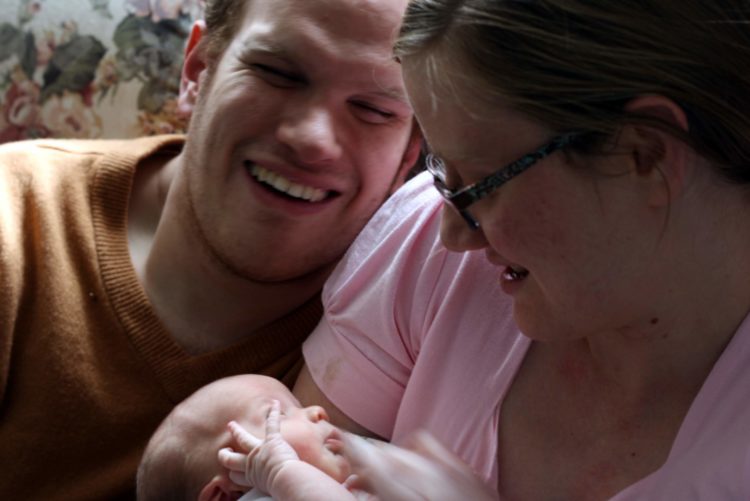Hey there! I’ve been in your shoes — that is, thinking about how to have children, and whether or not we should.
My husband, Michael, has spastic quadriplegic cerebral palsy, and we have two kids. I have CFS, which was mild before having kids, and is more moderate after going through two challenging pregnancies. We’re exhausted. We won’t be having any more children, largely because of our health.
But we’re also really, really happy. Our little ones are affectionate and funny and love to get our attention…sometimes by jumping on our faces, other times by asking us to play the xylophone with them, or making us goldfish and freeze-dried strawberry “soup” in a saucepan, and a million other sweet and hilarious and endearing things. They also love each other, at least most of the time, which is one of the most hopeful things I get to be a part of.
Before Michael and I had kids, we didn’t really have any interabled parents to talk to, so we did our best and went for it, and we had our first little one just a year and a half after being married. And I’m glad we did. Having our two little boys has been the best experience of our lives.
Even so, if I could go back in time and talk to pre-mama me, there’s a few things I’d tell myself, and that I’d say to other interabled couples thinking of having kids:
1.Ignore the haters. While there are real concerns and questions to consider when thinking about parenting with a disability, there are also — unfortunately — some people who simply don’t think people with disabilities should have kids. They’re wrong. Tons of people with disabilities make great parents. Just a few examples include Adele and Laurence Clark (featured in “Parents with Cerebral Palsy,” a documentary narrated by David Tennant), Talisha and Quentin (“Rolling Through Life With TALISHA“), Ben Mattlin (author of “In Sickness and In Health: Love, Disability, and a Quest to Understand the Perils and Pleasures of Interabled Romance“). There are parents with every type of disability. Also, adoption agencies can not categorically deny an applicant based on disability alone. Ultimately, deciding whether or not to parent with a disability comes down to a case-by-case basis that you, your doctors, and your partner know best.
2. Don’t rush. Michael and I thought it would be best to start having kids sooner rather than later in case Michael became less mobile down the road — and that was a valid consideration. That said, I’d probably tell a younger me to wait a little longer. Parenting would have been a little easier at the start if we had settled into a home we loved and a job trajectory we felt secure in. I also wish we had taken advantage of that time more as a couple, which becomes a much more scarce commodity after having kids. If, like us, you want to have children sooner so as to be in the best of health when you do, just be sure not to push aside other elements of financial, logistical and emotional preparation in order to do so.
3. Have a nest egg — in other words, money helps. Many interabled or disabled couples have financial needs that non-disabled couples don’t even have to think about. Budgets for groceries, transportation, adaptive equipment, physical therapy, medications and other costs can be significant for disabled or interabled couples before having children, but these costs can become much larger after having children. Sometimes one partner will drive or cook specialized meals on behalf of a disabled partner before having kids, but performing these tasks can be difficult and at times impossible after having children. All of that, of course, is in addition to the new needs and costs that children bring along with them, from food and clothes and toys to childcare and medical care.
4. Settle into a home you love, and one that’s kid-friendly. Having a spacious family room and an on-site washing machine is easier than living in a tiny apartment with a one-room kitchen-dining-living room and no storage space or washing machine. Similarly, having a backyard or a playground close by is a lot easier than living in a complex surrounded by parking lots and small businesses. We’ve lived in both types of places as parents, and the difference is huge. Of course, finances and location can limit the available options, but it’s also true that more “kid-friendly” doesn’t always mean “more expensive.”
5. Anticipate the possibility of a difficult pregnancy. This is true even for able-bodied partners! Many interabled couples divide responsibilities in a carefully calibrated system that pregnancy has a very real chance of throwing off. For me, pregnancy was very difficult and I was nearly bedbound for most of both. The first time, we had no idea what was coming; I got pregnant, and suddenly, I wasn’t able to drive Michael or help make food or work, or do much of anything else I had been doing before. Pregnancy involves major physical changes and with that comes a real and immediate risk of altered health and abilities. Becoming a parent would have been a little easier if we had been prepared for a difficult pregnancy the first time around. The second time, it was a little easier in that respect, even though I was still sick and it was definitely a challenge. If we decide we want more kids in the future, we’ll adopt.
6. Anticipate the possibility of future medical crises. At any point, an able-bodied partner in a marriage can become disabled, or a disabled partner can develop another disability. This is also true, of course, for non-disabled couples. As an interabled or disabled couple, however, it might not be as easy to switch roles or responsibilities, and as parents, these needs never really take a break…so it’s a good idea to have a few caregivers you can contact in a crunch, and a long term plan for if something happens to either partner.
7. Form a bond against ableism. Many of the challenges interabled couples and parents face would be easier if we lived in a more disability-conscious society. Just a few examples include inaccessible buildings, a lack of remote work options, a lack of caregiving resources, insurance companies that deem basic necessities as “unessential,” and the outright bias of some people… and the list goes on. We’ve made strides as a society towards providing accessibility in the workplace and education, but we still have a long way to go, and parents with disabilities aren’t often given much consideration.
8. Prepare for scrutiny. If you are a visibly interabled couple, you’ve probably been dealing with scrutiny for some time, but that only amplifies when you become a parent. Sometimes that scrutiny is harmless, but other times it can be a real problem. Disabled parents are more likely to be counseled to have an abortion by their doctors and can be vulnerable to an excessive amount of scrutiny from social services and legal courts in divorce cases, just because of their disability — even when they are competent parents with all the assistance they need to raise their children in a loving and safe home. The good news is, the love and support you receive can amplify too! So many of our friends and family have helped us with rides and babysitting and other needs in a pinch. They say it takes a village, and a supportive network can make such a difference.
9. Enlist more help than you think you need. If you can afford it, consider paying for cleaning help or a nanny or a caregiver — or all three! If finances are tight, enlist help from family and friends. We get cleaning and childcare help, and, in my experience, we need both. Kids take the business of making messes very seriously. Kids wake up early. Kids like to use parents as trampolines and jungle gyms. They are strong and stubborn and rough when they want to be. When we have enough help, being a parent is the most delightful experience I’ve ever had. But it is also one of the hardest things I’ve ever done, and all the more so when we’ve tried to do everything by ourselves. Having help can make the difference between swimming and drowning.
10. Just remember: you have no idea what you’re getting into. No parents do! Being a parent is one of those things that doesn’t sound too hard until you try it out, and then it takes the breath away from you — in both beautiful and hard ways.
Oh, and while this isn’t exactly a piece of advice, if you do have kids, let me know! If we’re lucky, our kids can have a play date together — and if not, we can still commiserate about the sleepless nights and mountains of magically reappearing laundry!


